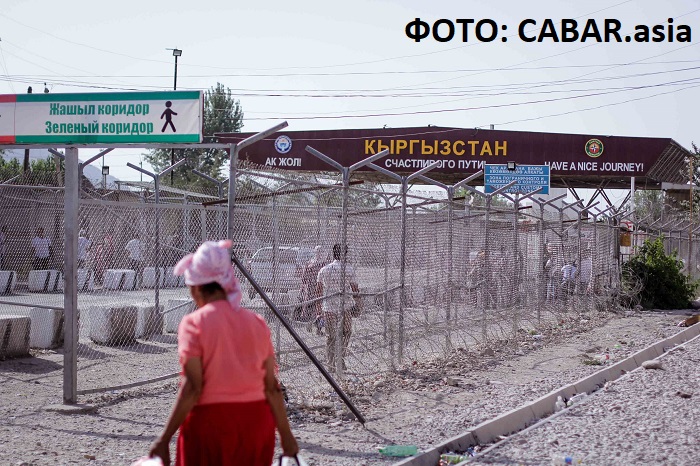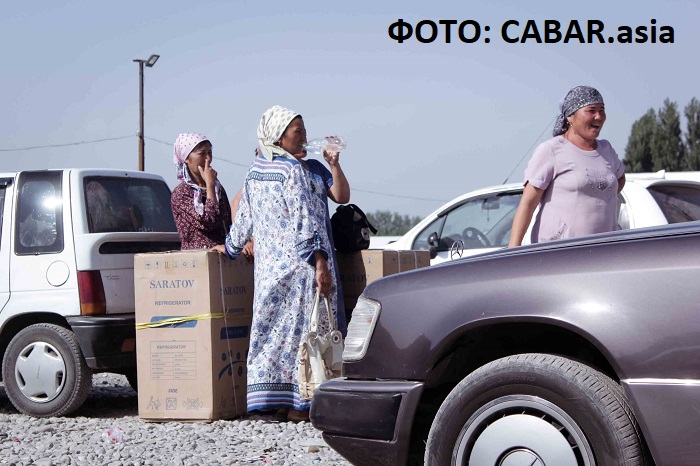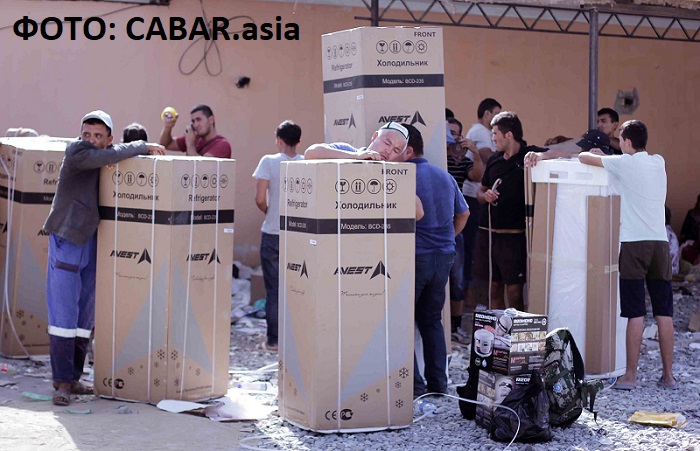More than a year has passed after the loosening of control at the Kyrgyz-Uzbek border. During this period, over two million people have crossed Dostuk checkpoint, which is seven times more compared to the similar period before the thaw in relations between the states. This has also affected the strengthening of kinship relationships, queues at the border and the growth of commodity turnover.
Follow us on LinkedIn

In September 2017, the largest Dostuk checkpoint was opened between Kyrgyzstan and Uzbekistan located between the cities of Osh and Andizhan as a result of bilateral agreements. Previously, if Kyrgyzstanis wanted to cross the border, they should have had a telegraphic invitation from their Uzbek relatives indicating the purpose of travel (wedding, funerals, or other significant events), now Kyrgyzstanis don’t have to wait for telegraphic messages. They can cross Dostuk checkpoint at any time without any additional documents and without hindrance.
Ten years ago Nargiza Maratova married a resident of Tashkent. She had a good job at Osh then and after the wedding neither her husband, nor her changed their citizenship. At first, the Russian language teacher and her husband lived in Kyrgyzstan. After Nargiza’s husband became ill, he moved to Tashkent, as he could use medical allowance there. And the resident of Osh often visited Uzbekistan. “Previously, when we used to cross Dostuk, we had to complete a declaration. We were screened by border and customs services. You were allowed to take 10-dollar commodities with you to Uzbekistan. All commodities were carefully screened; officers talked to you in private rooms. After you crossed the Dostuk checkpoint in Uzbekistan, you had to cross three more checkpoints. Traffic police officers used to stop us after Namangan, a mountain pass, so you had to register as a foreign citizen there and they checked you once again. It’s not only us who had difficulties, but also the residents of Uzbekistan. When Shavkat Mirziyoyev came to power, all checkpoints were removed. They are all gone now,” she said.
Another citizen of Tashkent, Bakhram, who came to Osh to visit his friend, also confirmed Nargiza’s words about the simplified process of crossing the Kyrgyz-Uzbek border.
“I was born in Osh, but when I turned four years old, my family moved to Uzbekistan. After that I rarely visited Osh. But after the opening of Dostuk, I have resumed my connections with relatives that live in Osh. Today I am here to visit my friends,” he said smiling. Ten thousand people crossed the border from Uzbekistan that day. Some of them came to Osh for a wedding or just to visit their relatives. But over 70 per cent were unskilled workers, who were hired by Uzbek entrepreneurs to carry goods through the border, thus avoiding customs duties. “Uzbekistan has high sales tax rate and high rental charges. Prices of household appliances can differ from prices at Kara Suu market by 20-100 dollars. Therefore, local entrepreneurs began to import goods from Kyrgyzstan when the border was opened. They hire people who convey the goods through Dostuk. These people earn a living this way,” Bakhram said. According to the Border Service of Kyrgyzstan, over 2.2 million people crossed the border via Dostuk per year. This is seven times more compared to the similar period of last year. Photo report by CABAR.asia: One day at the largest market of Fergana Valley Restrictions to importation of goods to Uzbekistan From June 1 this year, the government of Uzbekistan introduced new rules of transportation of goods by road, walkways and railways for individuals. Now, the total amount of goods must not exceed 300 dollars per border crossing. The weight of other goods (textiles, clothing, confectionery, foods, auto parts, tools and other household goods) must not exceed 2 kilogrammes, and the weight of all goods must not exceed 10 kilogrammes. These amendments were approved after the Uzbekistan-based company Artel, which produces almost all range of home appliances, addressed the president with a request to take measures against imported goods. According to Uzbekistanis, the demand for domestic household appliances has subsided after the border was opened. However, new amendments affect neither entrepreneurs nor hired workers. If previously an Uzbekistan-based craftswoman Mariyam used to come to Kara Suu market alone, now, after the new rules were introduced, she hires a few women to help her. “Previously, I could carry all my goods with me, and now I have to distribute them among those women, and I pay them for carrying the goods. I run a small workshop at home, and I need fabrics for it. Even despite the restrictions, it’s better now than it used to be three years ago,” she said. Duty-free goods In the past, long queues at Dostuk were a rare thing, but now they occur almost every day. Six passport control booths installed failed to deal with the passenger flow, and 16 more booths were installed at the checkpoint. Fast-food places, 24/7 currency exchange offices appeared around the checkpoint, parking lots are full of cars and people. A resident of Andizhan oblast, Shokhrukh, has been working for two months as the carrier of goods at the border. Six months ago he came back from Moscow. He was a truck driver there. But after his salary was cut down and his daughter became ill, he came back.
“We have no jobs. So we have to earn a living this way. I carry fruits to Kyrgyzstan, and domestic appliances, construction tools, fabrics, confectionery from Kyrgyzstan. I earn nearly 1,000 soms every day. When queues are long, I come home in the morning. I will work like that for some time and then I’ll leave for Russia again,” Shokhrukh said.
People carrying goods through the border earn 500 to 1,000 soms a day. The majority of people working at the border are women. Sometimes, pregnant women or women with babies. According to them, they have to work here as they don’t have jobs back home.
“We work here because we need to earn a living. We sit here from morning till evening. When we cross the border, some border officers claim money from us, and thus hinder the flow. Those who give money can cross without any problems. Also, not all booths function on the Kyrgyz side. It would be great if they all functioned,” one of women said.
When I asked them, “Do you carry goods across the border?”, people asked if I had goods with me. Many people refused not only to give interview, but to speak.
From China to Uzbekistan
The Kara Suu market is the second largest market in Kyrgyzstan after Dordoi. But after the accession to EAEU, the market has slowed down. Delivery of Chinese goods has become a difficulty and more expensive. Therefore, merchants had to make ends meet to cover at least container rental payments.
The opening of Dostuk was a long-expected event, but merchants differed in their opinions. Some felt an increase in trade; others said everything remained the same.
Aziz sells refrigerators and before the new rules were introduced, he used to sell 6-7 refrigerators every day. Now he can come home without selling anything, “Now our clients from Uzbekistan come to Kara Suu once a month. They buy home appliances, dowry for brides there.”
Another seller of home appliances Sultan said that after the opening of Dostuk checkpoint, local merchants cannot compete with Chinese wholesalers. So the opening of the Kyrgyz-Uzbek border is not of great significance for local merchants.
“Kyrgyz entrepreneurs cannot sell their goods at the same prices as the Chinese sellers. For example, if they sell something for 100 dollars, I will sell the same for 110 dollars. Where will the Uzbek entrepreneurs buy goods then?” he said.
Tynchtyk does not agree with Sultan because now 60 per cent of his clients come from Uzbekistan.
“Previously, I used to sell 120 TVs daily. And now the trade has declined by one half. But I don’t complain. Anyway, the trade has visibly improved compared to the times when the border was closed,” he said.
Experts differ in opinions
A Kyrgyzstan-based economist, Erkin Abdrazakov, said that the simplified procedure of crossing at the Kyrgyz-Uzbek border has led to the improvement of kinship relationships between the residents of both countries. According to him, another success of the opened Dostuk checkpoint is that ethnic Kyrgyz who didn’t have citizenship could prove their identity and obtain the citizenship of Kyrgyzstan.
However, the expert does not see any economic benefit for Kyrgyzstan. According to him, the trade has increased in the first months at Kara Suu market, but later on the market has stalled. Now Uzbek entrepreneurs, with the help of their partners in Kyrgyzstan, deliver the goods directly from China and bypass the Kara Suu market.
Also the economist is concerned with the duty-free goods that are being smuggled to Uzbekistan.
“If you go to Dostuk now, you can see how goods are conveyed through the border free of duty. There are hired workers who convey the goods of Uzbek entrepreneurs declaring them as personal belongings. They charge a fee for that. This is an open scheme. They don’t hide it. In terms of economy, we, as a member of EAEU, had to work in a civilised way and end the smuggling as soon as the Dostuk checkpoint was opened,” expert said.
Formally, the customs service of Kyrgyzstan didn’t register any facts of transportation of goods by hired workers. According to documents, they were registered as personal belongings under the EAEU customs code.
“The fact of transportation of goods by freight handlers or hired workers, citizens of Uzbekistan, was never established in the customs controlled area. Customs authorities are not allowed to monitor the territory beyond the customs controlled area. No cases of smuggling of goods have been registered at Dostuk checkpoint,” the authority’s message said.
A resident of Andizhan oblast, Shokhrukh, has been working for two months as the carrier of goods at the border. Six months ago he came back from Moscow. He was a truck driver there. But after his salary was cut down and his daughter became ill, he came back.
“We have no jobs. So we have to earn a living this way. I carry fruits to Kyrgyzstan, and domestic appliances, construction tools, fabrics, confectionery from Kyrgyzstan. I earn nearly 1,000 soms every day. When queues are long, I come home in the morning. I will work like that for some time and then I’ll leave for Russia again,” Shokhrukh said.
People carrying goods through the border earn 500 to 1,000 soms a day. The majority of people working at the border are women. Sometimes, pregnant women or women with babies. According to them, they have to work here as they don’t have jobs back home.
“We work here because we need to earn a living. We sit here from morning till evening. When we cross the border, some border officers claim money from us, and thus hinder the flow. Those who give money can cross without any problems. Also, not all booths function on the Kyrgyz side. It would be great if they all functioned,” one of women said.
When I asked them, “Do you carry goods across the border?”, people asked if I had goods with me. Many people refused not only to give interview, but to speak.
From China to Uzbekistan
The Kara Suu market is the second largest market in Kyrgyzstan after Dordoi. But after the accession to EAEU, the market has slowed down. Delivery of Chinese goods has become a difficulty and more expensive. Therefore, merchants had to make ends meet to cover at least container rental payments.
The opening of Dostuk was a long-expected event, but merchants differed in their opinions. Some felt an increase in trade; others said everything remained the same.
Aziz sells refrigerators and before the new rules were introduced, he used to sell 6-7 refrigerators every day. Now he can come home without selling anything, “Now our clients from Uzbekistan come to Kara Suu once a month. They buy home appliances, dowry for brides there.”
Another seller of home appliances Sultan said that after the opening of Dostuk checkpoint, local merchants cannot compete with Chinese wholesalers. So the opening of the Kyrgyz-Uzbek border is not of great significance for local merchants.
“Kyrgyz entrepreneurs cannot sell their goods at the same prices as the Chinese sellers. For example, if they sell something for 100 dollars, I will sell the same for 110 dollars. Where will the Uzbek entrepreneurs buy goods then?” he said.
Tynchtyk does not agree with Sultan because now 60 per cent of his clients come from Uzbekistan.
“Previously, I used to sell 120 TVs daily. And now the trade has declined by one half. But I don’t complain. Anyway, the trade has visibly improved compared to the times when the border was closed,” he said.
Experts differ in opinions
A Kyrgyzstan-based economist, Erkin Abdrazakov, said that the simplified procedure of crossing at the Kyrgyz-Uzbek border has led to the improvement of kinship relationships between the residents of both countries. According to him, another success of the opened Dostuk checkpoint is that ethnic Kyrgyz who didn’t have citizenship could prove their identity and obtain the citizenship of Kyrgyzstan.
However, the expert does not see any economic benefit for Kyrgyzstan. According to him, the trade has increased in the first months at Kara Suu market, but later on the market has stalled. Now Uzbek entrepreneurs, with the help of their partners in Kyrgyzstan, deliver the goods directly from China and bypass the Kara Suu market.
Also the economist is concerned with the duty-free goods that are being smuggled to Uzbekistan.
“If you go to Dostuk now, you can see how goods are conveyed through the border free of duty. There are hired workers who convey the goods of Uzbek entrepreneurs declaring them as personal belongings. They charge a fee for that. This is an open scheme. They don’t hide it. In terms of economy, we, as a member of EAEU, had to work in a civilised way and end the smuggling as soon as the Dostuk checkpoint was opened,” expert said.
Formally, the customs service of Kyrgyzstan didn’t register any facts of transportation of goods by hired workers. According to documents, they were registered as personal belongings under the EAEU customs code.
“The fact of transportation of goods by freight handlers or hired workers, citizens of Uzbekistan, was never established in the customs controlled area. Customs authorities are not allowed to monitor the territory beyond the customs controlled area. No cases of smuggling of goods have been registered at Dostuk checkpoint,” the authority’s message said.
 According to the Uzbekistan-based economist, analyst of CABAR.asia, Daria Ugai, the opening of the border has become an economic incentive for both countries. According to her, the external commodity turnover between neighbouring republics has increased by more than 50 per cent compared to the same period of last year in the first six months of 2018.
“It will have two potential outcomes for the Uzbek economy: an increase in exports of services and goods, as well as an increase in imports of non-foods. Exports expand the marketing opportunities of Uzbek goods and services. However, the goods imported from Kyrgyzstan stimulate the development of domestic competition among manufacturers,” Ugai said.
If it was very difficult to cross the Kyrgyz-Uzbek border at Dostuk checkpoint before 2017, now 10 to 12 thousand people cross it every day. The number of people crossing the border on weekends, on Saturdays and Sundays, reaches 18 thousand.
Elvira Sultanmurat kyzy is a participant of CABAR.asia’s School of Analytic Journalism
According to the Uzbekistan-based economist, analyst of CABAR.asia, Daria Ugai, the opening of the border has become an economic incentive for both countries. According to her, the external commodity turnover between neighbouring republics has increased by more than 50 per cent compared to the same period of last year in the first six months of 2018.
“It will have two potential outcomes for the Uzbek economy: an increase in exports of services and goods, as well as an increase in imports of non-foods. Exports expand the marketing opportunities of Uzbek goods and services. However, the goods imported from Kyrgyzstan stimulate the development of domestic competition among manufacturers,” Ugai said.
If it was very difficult to cross the Kyrgyz-Uzbek border at Dostuk checkpoint before 2017, now 10 to 12 thousand people cross it every day. The number of people crossing the border on weekends, on Saturdays and Sundays, reaches 18 thousand.
Elvira Sultanmurat kyzy is a participant of CABAR.asia’s School of Analytic Journalism
This article was prepared as part of the Giving Voice, Driving Change – from the Borderland to the Steppes Project implemented with the financial support of the Foreign Ministry of Norway.





















